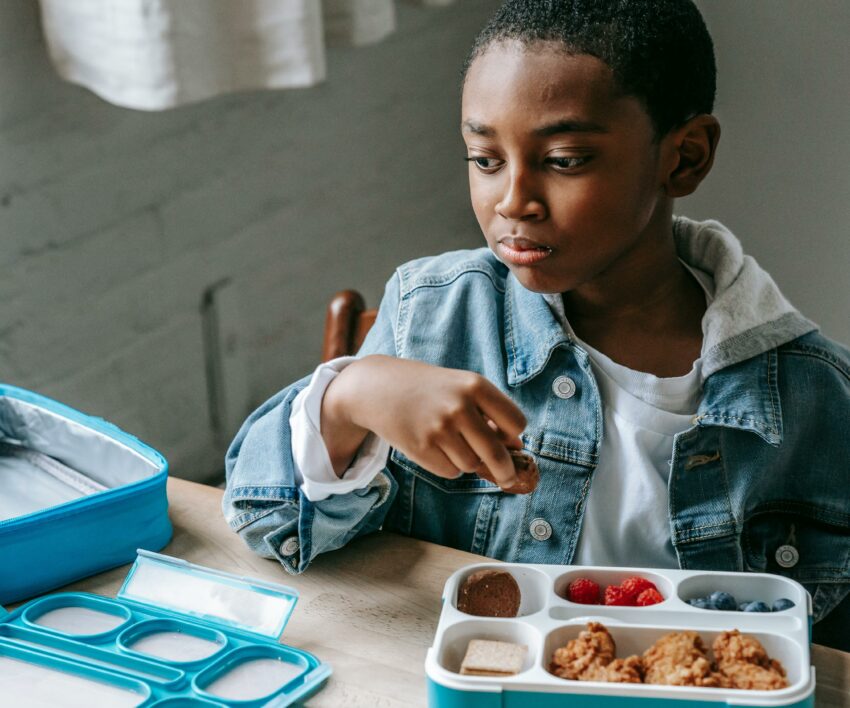
As the new school year kicks off, one of the most important tasks for parents is ensuring their children have lunches that fuel both their bodies and minds.
It’s not just about filling the lunchbox—it’s about packing the right nutrients to keep learners focused, energised, and ready to take on the day.
With a bit of planning and creativity, you can create lunches that are as healthy as they are delicious:
Every great lunch starts with the basics: whole grains, lean proteins, healthy fats, and colourful fruits and vegetables. These components work together to provide sustained energy, support growth, and boost concentration.
Here’s how you can balance it all:
- Whole grains: Opt for whole-grain bread, wraps, or crackers as the base for sandwiches and snacks. Whole-grain
- pasta or rice can also make a hearty, nutritious salad base.
- Proteins: Include grilled chicken, tuna, hard-boiled eggs, or vegetarian options like beans, chickpeas, or tofu. These proteins keep kids fuller for longer and sustain energy levels.
- Healthy fats: Avocado slices, nuts, seeds, or a small serving of cheese add flavour and healthy fats that support
- brain development.
- Fruits and veggies: Add a rainbow of colours with carrot sticks, cucumber slices, cherry tomatoes, and fresh
- fruits like apple slices, berries, or orange segments.
Portable proteins for an afternoon boost
Protein is the powerhouse of any meal, helping kids stay alert and focused. Portable options like Greek yoghurt, cottage cheese, or homemade trail mix can easily be included in lunch boxes. Pre-portioned snack packs of cheese and lean meats can also come in handy when time is short.
For schools with no afternoon snack breaks, boost the protein content of their main lunch. Try sandwich fillings like chicken slices or tuna salad, or add a handful of roasted chickpeas or edamame as a side.
Skip the processed snacks
While pre-packaged snacks may save time, many are packed with added sugars, unhealthy fats, and artificial ingredients. Instead, try these wholesome, homemade alternatives:
- Granola bars: Made with oats, honey, and dried fruits for a naturally sweet treat.
- Energy bites: A mix of nut butter, seeds, and a hint of cocoa for a satisfying snack.
- Popcorn: Air-popped and seasoned with a sprinkle of herbs or a dash of Parmesan.
- Dried fruits: Simple, pureed fruit dried into chewy goodness.
When buying snacks, avoid products with artificial colours, preservatives, and trans fats. Reading labels is important to ensuring the healthiest choices.
Adding colour
Eating with the eyes is half the battle, especially for kids. Bright and colourful fruits and vegetables look appealing and are loaded with nutrients. Try these ideas to make fruits and veggies more enticing:
- Fruit skewers: Alternate slices of strawberries, grapes, and melon on small skewers.
- Veggie cups: Pair crunchy vegetables like carrots and celery with a small tub of hummus or yoghurt dip.
- Creative pairings: Match apple slices with almond butter or cucumber sticks with tzatziki.
Presentation can make all the difference in how kids perceive their lunch. Use cookie cutters to shape sandwiches or fruits into fun designs. Bento boxes with compartments help separate food items, making it visually appealing and easy to eat. Involving your kids in packing their lunches can also give them a sense of ownership and excitement about what’s inside.
Keep hydration in mind
Staying hydrated is just as important as eating well. Pack a reusable water bottle to encourage drinking water throughout the day. To make it more exciting, try fruit-infused water with slices of lemon, cucumber, or berries. Avoid sugary drinks and sodas, which can lead to energy crashes.
As you prepare for the school year, remember that small changes can make a big difference. Focus on nutrient-rich ingredients, skip the processed snacks, and ensure hydration to help your child stay energised and focused. With these tips, you’ll be setting them up for a year of academic success and healthy eating habits that will last a lifetime.
Compiled by: Maegan-Leigh Jacobs
First published by Food & Home
Also see: Try these tips and help your kid navigate the first day at school anxiety with ease




